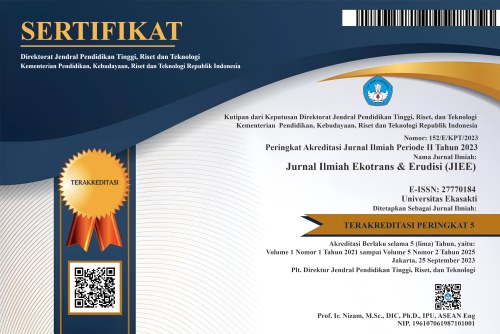Implementasi Kebijakan Pengendalian Penduduk Pada Dinas Pemberdayaan, Perlindungan Anak dan Pengendalian Penduduk (PPAPP) Provinsi DKI Jakarta
DOI:
https://doi.org/10.69989/mf8r2v02Keywords:
Kebijakan Pengendalian Penduduk, Dinas PPAPP, DKI JakartaAbstract
Berdasarkan data SDKI tahun 2017 Unmet Need di Provinsi DKI Jakarta sebesar 15,7%, angka tersebut masih di atas rata-rata nasional sebesar 10,6%. Hal ini menunjukkan bahwa masih terdapat masalah pengendalian penduduk di Provinsi DKI Jakarta. Keluarga Berencana atau kebijakan KB dalam meningkatkan akses pelayanan KB, salah satunya melalui pelayanan KB gratis. Pelaksanaan mobilisasi layanan KB gratis sebagai upaya strategis Dinas PPAPP Provinsi DKI Jakarta dalam meningkatkan partisipasi Pasangan Usia Subur dalam KB sehingga diharapkan dapat menurunkan angka fertilitas total (TFR). Penelitian ini menggunakan metode deskriptif kualitatif yang bertujuan untuk mendeskripsikan bagaimana implementasi kebijakan pengendalian kependudukan di Provinsi DKI Jakarta yang diatur dalam Peraturan Gubernur DKI Jakarta Nomor 43 Tahun 2017 tentang Penyelenggaraan Pelayanan Keluarga Berencana (KB) dan untuk mengetahui hambatan-hambatan dalam pelaksanaannya. pelaksanaan kebijakan tersebut. Wawancara mendalam dilakukan kepada pejabat Kantor PPAPP selaku pengelola dan pelaksana kebijakan KB. Hasil penelitian menunjukkan bahwa komunikasi dari level manajemen dilakukan secara berkala melalui rapat koordinasi. Adanya dukungan regulasi untuk pelaksanaan program. Komitmen pengelola dan pelaksana dalam upaya pencapaian target peningkatan pengendalian penduduk. Kendala pada pelaksanaan program pengendalian kependudukan dapat mempengaruhi pelaksanaan menjadi kurang optimal.
Downloads
References
Adi, I. R. (2018). Kesejahteraan sosial (pekerjaan sosial, pembangunan sosial dan kajian pembangunan). Depok: Rajawali Pers.
Al-Attar, G. S., Bishai, D., & El-Gibaly, O. (2017). Cost-effectiveness analysis of family planning services offered by mobile clinics versus static clinics in Assiut, Egypt. African journal of reproductive health, 21(1), 30-38.
Anderson, J. E. (2011). Public policymaking: an introduction Seventh Edition. Wadsworth, Cengage Learning: Texas A&M University.
Bang, K. S., Chae, S. M., Lee, I., Yu, J., & Kim, J. (2018). Effects of a community outreach program for maternal health and family planning in Tigray, Ethiopia. Asian nursing research, 12(3), 223-230.
Bawing, P. (2017). Analisis pelaksanaan kebijakan program keluarga berencana: studi kasus di Malinau. Berita Kedokteran Masyarakat (BKM Journal of Community Medicine and Public Health).
Bessant, J., Watts, R. & Dalton, S. (2006). Talking Policy: How Social Policy in Made.
Crows Nest: Allen and Unwin.
BKKBN. (2015). Rencana strategis badan kependudukan dan keluarga berencana nasional tahun 2015 - 2019. Jakarta
BKKBN. (2019). Panduan penyelenggaraan pelayanan KB bergerak. Kedeputian Bidang Keluarga Berencana dan Kesehatan Reproduksi. Jakarta
BKKBN. (2019). Survei kinerja dan akuntabilitas program KKBPK (SKAP) keluarga. Jakarta.
Dinas Pemberdayaan Perlindungan Anak dan Pengendalian Penduduk Provinsi DKI Jakarta. (2019). Laporan kinerja instansi pemerintah tahun 2019. Jakarta.
Dunn, W. N, (2003). Pengantar analisis kebijakan publik edisi kedua. Yogyakarta: Gajah Mada University Press.
Dye, T. R. (2013). Understanding Public Policy 14th ed. Pearson Education, Inc.
Edwards III, G. C. (1980). Implementing Public Policy. Washington D.C.: Congressional Quarterly Press.
Ewerling, F., Victora, C. G., Raj, A., Coll, C. V., Hellwig, F., & Barros, A. J. (2018). Demand for family planning satisfied with modern methods among sexually active women in low-and middle-income countries: who is lagging behind?. Reproductive health, 15(1), 42.
Grindle, M. S. (1980). Politics and Policy Implementation in the Third World. New Jersey: Princeton University Press.
Herbert, S. (2015). Social norms, contraception and family planning. GSDRC Helpdesk Research Report, 1–15.
Jarvis, L., Wickstrom, J., & Shannon, C. (2018). Client perceptions of quality and choice at static, mobile outreach, and special family planning day services in 3 African countries. Global Health: Science and Practice, 6(3), 439-455.
Jones, C. O. (1984). An Introduction to Study of Public Policy. California: Cole Publishing Company.
Karpilow, Q. C., & Thomas, A. T. (2016). Reassessing the Importance of Long Acting Contraception. American Journal of Obstetrics and Gynecology, 216(2), 148.e1- 148.e14. doi: 10.1016/j.ajog.2016.10.012.
Kistiana S. (2018). Keinginan pemakaian kontrasepsi di masa mendatang pada wus yang tidak ber-KB di Indonesia. Jurnal Keluarga Berencana, ejurnal.bkkbn.go.id DOI: https://doi.org/10.37306/kkb.v3i1.4.
Lester, J. P., & Stewart Jr., J. (2000). Public Policy - An Evolutionary Approach. Belmont: Wadsworth – Thomas Learning.
Lotke, P. S. (2015). Increasing use of long-acting reversible contraception to decrease unplanned pregnancy. Obstetrics and Gynecology Clinics, 42(4), 557-567.
Manafe, D. (2020). BKKBN Ungkap Dua Tantangan Turunkan Angka Kelahiran. Diakses dari https://www.beritasatu.com/feri-awan-hidayat/kesehatan/599871/bkkbn-ungkap- dua-tantangan-turunkan-angka-kelahiran.
Moharana, P. R., Kumari, N., Trehan, S., & Sahani, N. C. (2014). Mobile family planning unit: An innovation for expanding accessibility to family planning services in Bihar. Indian journal of public health, 58(4), 289. doi: 10.4103/0019-557X.146308.
Mulia, R. A., & Saputra, N. (2021). Systematic Literature Review: Determination of Government Policy in Health and Education Development for Improved Human Capital. Jurnal EL-RIYASAH, 12(1), 92-107.
Newman, L. (2006). Social Research Methods Qualitative and Quantitative Approaches.
Nugroho, D. Riant. 2003. Kebijakan Publik: Formulasi, Implementasidan Evaluasi. Jakarta: PT. Elex Media Komputindo
Boston: Allyn & Bacon.Parsons, W. (1996). Public Policy: An Introduction to Theory and Practice of Public Policy Analysis. Aldershot: Edward Elgar.
Pickle, S., Wu, J., & Burbank-Schmitt, E. (2014). Prevention of unintended pregnancy: a focus on long-acting reversible contraception. Primary Care: Clinics in Office Practice, 41(2), 239-260. doi: 10.1016/j.pop.2014.02.004.
Ross, J. A., & Pham, S. B. (1997). Unmet need for contraception in Vietnam: who needs what and when. Social biology, 44(1-2), 111-123.
Rubin, A., & Babbie, E. R. (2008). Research Methods for Social Work. Belmont: Thomson Brooks/Cole.
Saputra, N., & Mulia, R. A. (2021). Pengaruh Kompetensi, Lingkungan Kerja Dan Motivasi Berprestasi Terhadap Kinerja Pegawai Negeri Sipil Sekretariat Daerah Kota Padang. Jurnal Ilmiah Ekotrans & Erudisi, 1(1), 1-24.
Sedgh, G., Singh, S., & Hussain, R. (2014). Intended and unintended pregnancies worldwide in 2012 and recent trends. Studies in family planning, 45(3), 301-314.
Suharto, E. (2010). Analisis Kebijakan Publik. Bandung: Alfabeta.
Downloads
Published
Issue
Section
License
Copyright (c) 2021 Mardi Adam, Roy Valiant Salomo, Yasir Riady (Author)

This work is licensed under a Creative Commons Attribution-ShareAlike 4.0 International License.
Copyright Notice
An author who publishes in the journal "Jurnal Ilmiah Ekotrans & Erudisi" agrees to the following terms:
Author retains the copyright and grants the journal the right of first publication of the work simultaneously licensed under the Creative Commons Attribution-ShareAlike 4.0 License that allows others to share the work with an acknowledgement of the work's authorship and initial publication in this journal
Author is able to enter into separate, additional contractual arrangements for the non-exclusive distribution of the journal's published version of the work (e.g., post it to an institutional repository or publish it in a book) with the acknowledgement of its initial publication in this journal.
Author is permitted and encouraged to post his/her work online (e.g., in institutional repositories or on their website) prior to and during the submission process, as it can lead to productive exchanges, as well as earlier and greater citation of the published work (See The Effect of Open Access).
All materials in this site are protected by the law. It is prohibited to quote a part of or all of this website contents for commercial purposes without the permission or consent of the editors.
If anyone finds one article or more in this journal violate or potentially violate one’s copyrights, please report to us through e-mail of Principle Contact.
Legal-formal aspects of accessing any information and manuscript in this journal website refer to the provision of license Creative Commons Attribution-Share Alike (CC BY-SA). Read more about the Creative Commons Attribution-ShareAlike 4.0 Licence here: https://creativecommons.org/licenses/by-sa/4.0/.
All information available in 'Jurnal Ilmiah Ekotrans & Erudisi' is academic in nature. 'Jurnal Ilmiah Ekotrans & Erudisi' is not responsible for loss due to the abuse of information in the website.
Information
Notice about change in the copyright policy of the journal 'Jurnal Ilmiah Ekotrans & Erudisi' : "From Volume 1, Nomor 1 onwards the copyright of the article published in the journal 'Jurnal Ilmiah Ekotrans & Erudisi' will be retained by the author"
Privacy Statement
The names and email addresses entered in this journal site will be used exclusively for the stated purposes of this journal and will not be made available for any other purpose or to any other party.




































